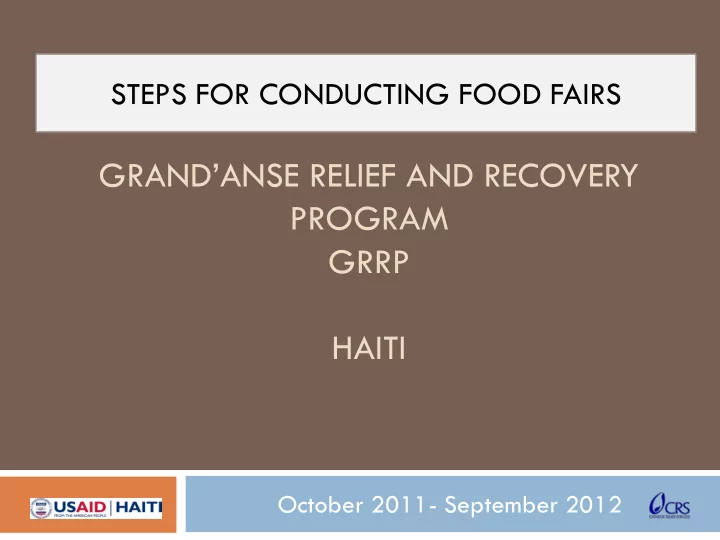

STEPS FOR CONDUCTING FOOD FAIRS GRAND’ANSE RELIEF AND RECOVERY PROGRAM GRRP HAITI October 2011- September 2012
Food Fair Implementation Process The success of a food fair depends on proper planning. Before beginning, one should: Ensure that there is a clear need for food Assess whether appropriate varieties are available, and in adequate quantities Assess the security situation in the area Poor planning can lead to several complications: a shortage of food sellers at the fair, inappropriate varieties sold at the fair, not enough choice of varieties, and inflated prices
Steps Pre-Fair Day Identification of Beneficiaries and Vendors Distribution of ID cards Assessment of quantity of food stock available Community Sensitizations Select fair sites Fair Day Vendor Registration Beneficiary Registration Post Fair Vendor Payment
Pre-Fair: Beneficiary Selection Beneficiaries were selected based on the following criteria 0.32 hectares of land 1-3 medium sized animals (i.e.: goat or pigs) Priority was given to those that are deemed extremely poor such as tenant farmers without any land or animals
Pre-Fair: Community Sensitizations After selecting participants, community sensitizations were held with both beneficiaries and vendors. The discussion centered on: • Why it was agreed that a food fair is the most appropriate intervention •Review the merits of conducting a food fair • The steps involved , rules and regulations and fair dates
Pre-Fair: Advertising Food Fair Each month, community meetings are held in order to inform beneficiaries and vendors the dates of the next month’s fairs. Posters are also used to identify accredited vendor shops.
Pre-Fair: Voucher Design and Printing Vouchers were fabricated in the Dominican Republic. The voucher clearly shows the agency logo and the value. Different denominations are indicated by color and with dots to ensure that illiterate people can distinguish between them.
Fair Day :Seller Registration All vendors are registered before participating in the fair. On the day of the fair an inspection is conducted to assess the amount, type, and varieties of food brought to the market At the time of registration, CRS and partners also to examine the quality of food, and accept or reject certain items brought by sellers
Fair Day: Distribution of Vouchers To avoid losses and cheating, vouchers are s on the day of the fair, not in advance. Before vouchers are distributed, all participants are re-sensitized about how the fair will operate, prices of the various products, and the value of the vouchers. Vulnerable individuals are called to the front of the line to receive their vouchers first
Fair Day: Distribution of Vouchers: Beneficiaries Receiving Vouchers
Voucher Distribution, Les Abricots, Haiti
Fair Day: Setting Prices Prices for the products sold in the market are established by a randomly selected group of vendors the day of the fair. Fair items cannot be sold above the price of items in the local market
Food Fair Food Fair in Les Abricots, Haiti
Transactions: Beneficiaries may choose from multiple vendors
Transactions: Vendors with items for sale
Transactions Beneficiaires at Anse du Claire (Abricots, Haiti) after purchasing products
Evaluation After making purchases, beneficiaries bring their purchases for weigh-in and an evaluation is conducted to measure the quantity of items purchased and satisfaction with the fair
Beneficiaries leaving fair in Bonbon, Haiti
Post Fair: Vendor Payment Vouchers collected by each vendor are counted and noted on site after all transactions have been made Vendors receive a receipt detailing how many vouchers of each denomination they collected One week after each fair, vendors come to CRS’ office to receive a check for the value of vouchers collected on the day of the fair
Recommendations Communities should be implicated in each phase of project implementation Create universal vulnerability criteria for beneficiary selection (specific to each department) Use technologies such as GPS to better identify and locate beneficiaries Strengthen the capacity of the government to carry out a general population census
Quick Facts About Electronic Food Voucher Program: 12,000 families (72,000 people) $3.6 mln disbursed through vouchers electronically 9 rural communities covered (remote and logistically difficult to access) 68 rural shops participating as redemption points Each voucher = HTG 2,000 ($50) Core products in the food basket: 1) Beans, 2) Maize, 3) Rice 4) Vegetable Oil – procurement relying on the local market and supply chain.
• In Partnership with a leading Haitian Mobile company “Digicel”, CARE-Haiti developed an electronic voucher platform “Merchant Pro”, which uses mobile coverage for the electronic cash transfer to the beneficiaries without actual cash in hand.
The electronic voucher system tracks the e-cash transfer up to the seconds. System also tracks when the transaction was made, at which locations, what time and what amount was used by which beneficiary to get the food. Electronic Voucher system cuts down on the cost of printing physical vouchers, ensuring anti-fraud mechanisms (holograms), distribution, etc.
once selected, the beneficiaries come to designated places for e-registration. Pre-loaded data about each beneficiary is checked on the smart phone by Digicel staff and once confirmed, Voucher card and a PIN card are handed over.
Information on the beneficiaries and selected merchants is uploaded on “MERCHANT PRO” electronic platform (managed by the program)
Electronic Food Voucher Program has an instant access to voucher lists, redemption rates, store information, etc
Merchants are selected based • on their capacity and willingness to follow voucher rules; They are trained on the use of • technology A shop can be as small as this!!! (left)
USSD menu • & string of codes verify the voucher balance. PIN Code • [entered by the beneficiary] approves transfer of voucher amount Once • transaction is confirmed, the food can be taken by beneficiaries
Beneficiaries waiting at a shop to redeem the vouchers Beneficiary from Chambellan community
Animated posters are used to support the education of those beneficiaries that cannot read and write
Recommend
More recommend